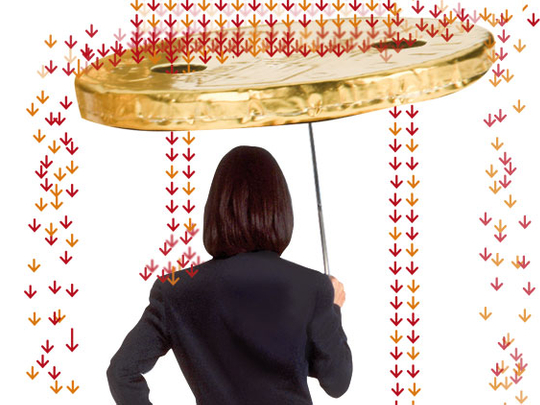
The first few months of 2010 could very well be your last chance to buy gold at a decent price around $1,000 (Dh3,672) an ounce, as there will be increases in the longer term.
Demand for bullion will continue to be robust this year with central banks, especially those with heavy exposure to the US dollar, expected to buy more gold than they sell, industry experts said.
Christopher Wood, chief strategist at the broker CLSA who had predicted the US housing crisis, forecasted in early 2009 that the precious metal is likely to more than quadruple to $3,500 per ounce this year (2010). There are certainly indications that point to higher gold prices, but according to Rolf Schneebeli, former head of the World Gold Council, price increases will happen at the end of 2010 and the rate could well be between $1,300 and $1,500 per ounce.
Price consolidation
"However, during the first one or two quarters, there could be a price consolidation during which the price might drop towards the $1,000 level," Schneebeli told Gulf News.
As of Tuesday, gold prices fell below $1,100 as the greenback gained strength against other currencies. The strengthening of the dollar is seen to dampen bullion prices temporarily, but the long-term forecast (three to five years) for gold remains "relentlessly bullish," said Keerthik Sasidharan, a banker with European Investment Bank in New York.
John McGaw, senior advisor to Golden Oryx, said that capital preservation is now mostly seen as much more important than yield that gold is now the preferred play for many. He noted that the opportunity cost of holding gold has steadily fallen, owing to tumbling interest rates, yet the potential benefits are significant.
"In the year ahead, it would not surprise me to see central banks remain net buyers of gold, especially those with heavy exposure to the US dollar. If this happens, it will be the first time for more than 20 years that central banks have become net buyers rather than sellers," McGaw said.
Growing fascination with the metal is already evident. There has been a buying frenzy and rising interest in gold investing. Russia has boosted its gold holdings by 87 tonnes to 606 tonnes, while India has agreed to purchase 200 tonnes of gold from the International Monetary Fund and Sri Lanka bought another 10 tonnes.
McGaw also noted that sales of gold coins have surged and exchange traded funds (ETFs) are attracting more investors, with strong interest coming from the retail sector. In the United Kingdom, gold coin production in the third quarter of 2009 was four times higher than the previous year's level.
ETF Securities also reported that six out of 10 of its biggest inflows in November were into precious metals, rather than other commodities.
"All these points to an uptrend in gold price for the foreseeable future and, as an asset class, should represent a five to 10 per cent weighting in an average investment portfolio," McGaw points out.
After it was almost forgotten in the 80s and 90s, gold has recently reestablished itself as a safe haven for assets. The collapse of the Lehman Brothers in September 2007 was the turning point, when investors scrambled to secure their wealth. Consequently, the metal saw some significant price increases.
Evidently, it is the fear of inflation and a double-dip recession that is likely to fuel an uptrend for gold in the longer term.
"It is clear that the crisis has been very severe and the central banks could only avoid the worst by pumping in incredible amounts of money into the system. These amounts need to be taken out of the system very quickly to avoid a massive inflation in the future, but all the central banks are afraid of doing this by increasing interest rates, due to fears (that the economic upturn will be halted) early in the process," Schneebeli said.
Double-dip recession
"There is also the fear of a double-dip recession with a second drop of economic activity during 2010 after the first support actions of some governments have run out, which makes the central banks very cautious in not increasing the rates too early. All these means that inflation is certainly coming—- it's just a question if it is coming already (this year) or only the year after. For gold, this means a certain increase in prices in the longer term," he added.
With the outlook for 2010 still uncertain, it is only highly plausible that gold will further attract more supporters. "Gold, of course, is traditionally a safe haven in times of uncertainty and, as such, a long recognised global currency that will benefit—and has benefited—from economic uncertainty," noted McGaw.
He said the uncertain outlook for 2010 is based on two conflicting scenarios: inflationary pressures brought on by central banks keeping lending rates artificially low to stimulate spending and a globally integrated financial system that is severely indebted and vulnerable to rising interest rates.
Gurnos Stonuary, business services director at Nexus Insurance Brokers, earlier said the only way to make any profit out of gold is to buy it low and sell it high. "It sounds obvious, but as gold purchase will never pay a rate of interest or dividends, there is no other way to make money from buying gold other than through the judgment of the market."












